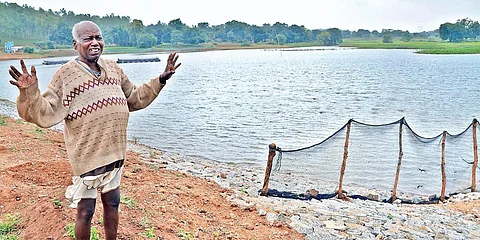

JHARKHAND: Severe water scarcity, repeated crop failures, indiscriminate deforestation and erratic weather patterns — for 28 years, Simon Oraon saw it all from his thatched house at Khaksi Toli village under Bero block, about 45 km from Ranchi.
Despite being endowed with six waterfalls, farmers in the region struggled to make their ends meet in absence of a water restoration system. With little option left, more and more farmers were forced to migrate to the cities in search of better livelihood over the years.
Pained by the repeated crop failures, Oraon in 1960 decided to build a check dam to store rainwater. In the subsequent years, he undertook a massive tree-plantation drive, well and pond digging initiatives.
Today, the Bero block boasts of lush green fields, dotted with small ponds that are linked with dams which act as water reservoirs. Today, Bero block boasts of lush green forests and fields, with small ponds linked with dams, which act as water reservoirs, thanks to Oraon.
In the last six decades, this Class I dropout has transformed the lives of thousands of villagers in Jharkhand with his massive tree-planting and water conservation efforts and turned Bero Block into an agricultural hub.
Recognising his efforts in forestry and water conservation, Oran, 85, also known as the 'waterman of Jharkhand', was awarded the Padma Shri — the fourth highest civilian honour in India – in 2016.
"When I was of 13, I used to discuss with my father why the crops in the area failed despite having six waterfalls. Despite our hard work, intensive rain would wash away everything. Hence, a plan was chalked out to construct a check dam," says Oraon.
But Oraon knew that it was easier said than done. "I tried to convince people of my village, but initially, they were reluctant to donate their land for the purpose. After three long years, I finally succeeded in convincing them," adds Oraon.
Initial failures
The first dam near his village in Narpatna was constructed in 1961 when he was only 28. But the dam was washed away during the next monsoon.
In fact, Oraon had to face many subsequent hurdles as several dams failed to withstand the monsoon water, till the water resource department stepped in to build a strong check dam. In following years, check dams were also constructed in Jharia, Narpatna, Kharia, Gaighat, Deshbali and a few other locations in nearby villages.
Today, Bero block produces more than 20,000 metric tons of vegetables which are also supplied to adjoining states such as Bihar, Odisha and West Bengal.
Protecting flora
Oram has also been working in 51 villages under the Bero block to protect natural flora for decades and has played a key role in the construction of six ponds and a number of wells for cultivation. “It was only due to Oraon’s life-long efforts, we have greenery throughout the year the region,” said Block Development Officer, Bero, Vijay Kumar Soni.
Struggle is far from over
Oraon himself struggles on the personal front. He along with his wife in a thatched house the roof of which leaks during the monsoon. But enter his house, one would see Oraon proudly displays all the certificates that he has received over the years and newspaper cuttings on his movement on the wall. A large chunk of his income comes from his farming and herbs which he prepares at his home.